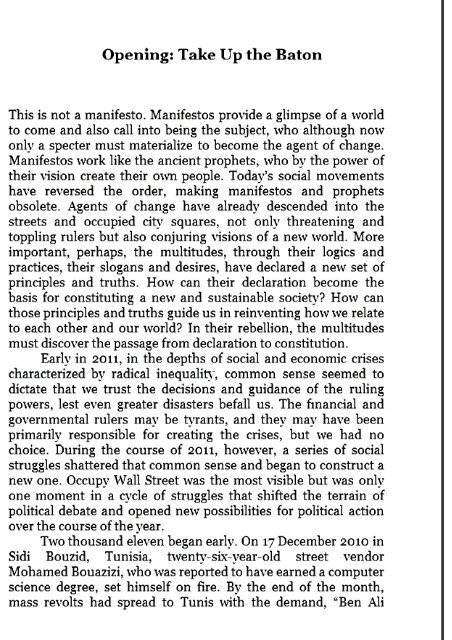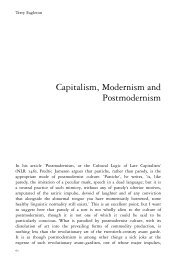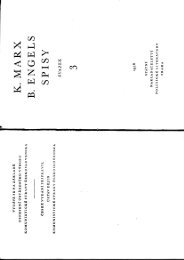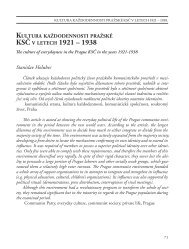Chapter 1: Subjective Figures of the Crisis ... - Negri in English
Chapter 1: Subjective Figures of the Crisis ... - Negri in English
Chapter 1: Subjective Figures of the Crisis ... - Negri in English
Create successful ePaper yourself
Turn your PDF publications into a flip-book with our unique Google optimized e-Paper software.
Open<strong>in</strong>g: Take Up <strong>the</strong> Baton<br />
This is not a manifesto. Manifestos provide a glimpse <strong>of</strong> a world<br />
to come and also call <strong>in</strong>to be<strong>in</strong>g <strong>the</strong> subject, who although now<br />
only a specter must materialize to become <strong>the</strong> agent <strong>of</strong> change.<br />
Manifestos work like <strong>the</strong> ancient prophets, who by <strong>the</strong> power <strong>of</strong><br />
<strong>the</strong>ir vision create <strong>the</strong>ir own people. Today's social movements<br />
have reversed <strong>the</strong> order, mak<strong>in</strong>g manifestos and prophets<br />
obsolete. Agents <strong>of</strong> change have already descended <strong>in</strong>to <strong>the</strong><br />
streets and occupied city squares, not only threaten<strong>in</strong>g and<br />
toppl<strong>in</strong>g rulers but also conjur<strong>in</strong>g visions <strong>of</strong> a new world. More<br />
important, perhaps, <strong>the</strong> multitudes, through <strong>the</strong>ir logics and<br />
practices, <strong>the</strong>ir slogans and desires, have declared a new set <strong>of</strong><br />
pr<strong>in</strong>ciples and truths. How can <strong>the</strong>ir declaration become <strong>the</strong><br />
basis for constitut<strong>in</strong>g a new and susta<strong>in</strong>able society How can<br />
those pr<strong>in</strong>ciples and truths guide us <strong>in</strong> re<strong>in</strong>vent<strong>in</strong>g how we relate<br />
to each o<strong>the</strong>r and our world In <strong>the</strong>ir rebellion, <strong>the</strong> multitudes<br />
must discover <strong>the</strong> passage from declaration to constitution.<br />
Early <strong>in</strong> 2011, <strong>in</strong> <strong>the</strong> depths <strong>of</strong> social and economic crises<br />
characterized by radical <strong>in</strong>equality', common sense seemed to<br />
dictate that we trust <strong>the</strong> decisions and guidance <strong>of</strong> <strong>the</strong> rul<strong>in</strong>g<br />
powers, lest even greater disasters befall us. The f<strong>in</strong>ancial and<br />
governmental rulers may be tyrants, and <strong>the</strong>y may have been<br />
primarily responsible for creat<strong>in</strong>g <strong>the</strong> crises, but we had no<br />
choice. Dur<strong>in</strong>g <strong>the</strong> course <strong>of</strong> 2011, however, a series <strong>of</strong> social<br />
struggles shattered that common sense and began to construct a<br />
new one. Occupy Wall Street was <strong>the</strong> most visible but was only<br />
one moment <strong>in</strong> a cycle <strong>of</strong> struggles that shifted <strong>the</strong> terra<strong>in</strong> <strong>of</strong><br />
political debate and opened new possibilities for political action<br />
over <strong>the</strong> course <strong>of</strong> <strong>the</strong> year.<br />
Two thousand eleven began early. On 17 December 2010 <strong>in</strong><br />
Sidi Bouzid, Tunisia, twenty-six-year-old street vendor<br />
Mohamed Bouazizi, who was reported to have earned a computer<br />
science degree, set himself on fire. By <strong>the</strong> end <strong>of</strong> <strong>the</strong> month,<br />
mass revolts had spread to Tunis with <strong>the</strong> demand, "Ben Ali










